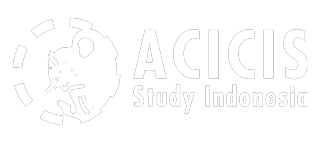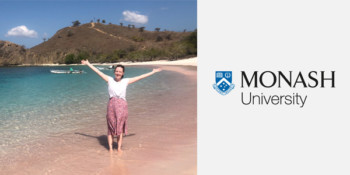Erin Van Zetten is a 2019 New Colombo Plan mobility grant recipient from Monash University. Erin undertook the Development Studies Immersion Program at Universitas Gadjah Mada in Semester 2, 2019.
Q: Why did you decide to undertake ACICIS’ Development Studies Immersion Program (DSIP) ?
I study Indonesian at university and wanted to complete a semester in Yogyakarta to improve my language skills and immerse myself in Indonesian culture. I chose the DSIP program so I could gain practical work experience and intern with an Indonesian NGO.
Q: Did you receive a New Colombo Plan Mobility Grant? If so, how did this contribute to your experience in Indonesia?
Yes, I received the New Colombo Mobility Grant. This money took the financial pressure out of studying abroad and it allowed me to explore more of Yogyakarta and Indonesia throughout the semester.
Q: How will the DSIP influence your future career or study?
The Development Studies Immersion Program works really well with my Global Studies degree. It has enabled me to practise and improve my Indonesian language skills as I have been exposed to more Indonesian throughout the last five months than during two years at university! My internship has taught me important skills needed for working in a cross-cultural environment and helped me improve my intercultural communication skills for my career. The program allowed me to put theoretical frameworks learnt at university into practice.
Q: How does development in Indonesia differ to what you’ve seen before?
My favourite component of the Development Studies Immersion Program was seeing Indonesia’s developmental issues and solutions firsthand. Every week during the first half of semester we attended a seminar on one developmental issue in Indonesia, followed by a field trip to see how the issue is being overcome. For me, the most enjoyable field trip was to PPMK – an organisation which provides financial loans to women in the community to help them start or expand their small businesses. After listening to a seminar on ‘gender and development’ it was very interesting to learn how the work that PPMK do empowers women and provides them with the money and skills to become more economically independent. These fieldtrips enabled me to gain a deeper understanding and appreciation of development in Indonesia – much more than I could ever learn in a classroom back home.
Q: What do you like to do in your spare time in Yogyakarta?
I love to go to cafes. There are so many nice cafes in Yogya and they are the perfect place to catch up with friends or complete an assignment. Every day after my internship we would try out a different cafe, and even after five months I am still finding new cafes! We also enjoy playing pool or booking a karaoke room whenever we have spare time!
Q: Are you undertaking an internship or student community service (KKN) while in Indonesia?
As part of the DSIP program, I undertook an 8-week internship at Rifka Annisa. Rifka Annisa is a women’s crisis centre in Yogyakarta which helps victims of domestic violence. They provide psychological consultations, legal assistance and safe housing for victims and male counselling to try and change the behaviour of perpetrators. They also run community programs to empower women and increase society’s understanding of domestic violence. During the internship I wrote an article for the AIYA blog about domestic violence in Indonesia, participated twice in Rifka Annisa’s radio show on a local station, observed presentations and community outreach programs and conducted interviews with counsellors in Indonesian. I also completed a detailed report on the prevalence of domestic violence in Indonesia and its effects on the mental health of victims. This internship was a really valuable way for me to gain experience with an NGO in a new country and immerse myself in a different workplace culture.
Q: Favourite Indonesian food/place to eat:
Lotek – A Javanese dish consisting of vegetables and crackers covered with a delicious peanut sauce! I usually eat lotek from a local warung.
Q: Favourite Indonesian word/phrase:
Jam karet – literally translates to ‘rubber time’. This phrase perfectly reflects the Indonesian approach to time! I quickly learnt that events rarely start on time and that it is often acceptable to arrive late when catching up with others.
Q: What places in Indonesia have you visited during your Semester so far?
I have been to Lombok, Bali, Komodo islands, Solo, Jakarta and many places in and around Yogyakarta!


